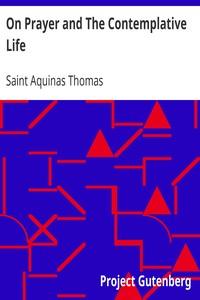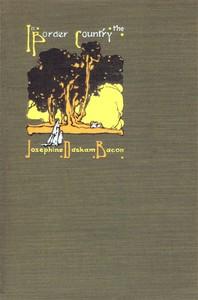Read this ebook for free! No credit card needed, absolutely nothing to pay.
Words: 84041 in 36 pages
This is an ebook sharing website. You can read the uploaded ebooks for free here. No credit cards needed, nothing to pay. If you want to own a digital copy of the ebook, or want to read offline with your favorite ebook-reader, then you can choose to buy and download the ebook.


: On Prayer and The Contemplative Life by Thomas Aquinas Saint Pope Hugh Translator - Prayer; Thomas Aquinas Saint 1225?-1274; Contemplation
INTRODUCTION
QUESTION CLXXX OF THE CONTEMPLATIVE LIFE
INDEX
INDEX OF TEXTS QUOTED OR EXPLAINED
INTRODUCTION
And we have been led to do this for several reasons. The Mystical life is the life of union with God, and it is based essentially on Prayer and Contemplation. But prayer and contemplation, though simple in themselves, are yet fraught with difficulties and dangers unless we be wisely guided. And as Father Faber shrewdly says: when we ask for instruction in these things, let us by all means make appeal to those whose names begin with S--let us, in other words, go to God's Saints. And the reason is simple: these Saints are no mere idle sign-posts who point the way but stand still themselves; they themselves have been where they would have us go; they speak from no mere theoretical knowledge; they themselves have tasted and seen that the Lord is sweet!
Further, it would have been easy to cull from S. Thomas's writings the salient points of his teaching on these points, and to have presented them in an attractive form. But had we done so the teachings of the Saint would have lost much of their force, and readers might well have doubted at times whether they really had before them the mind of S. Thomas or that of the translator. It is preferable to read the Bible than what men have said about the Bible. Unfortunately, it is the fashion nowadays to consider S. Thomas's writings "out of date"! If the perusal of these pages shall have induced some few at least to go to the original and study it for themselves they will have more than fulfilled the translator's desires.
Perhaps one of the commonest errors regarding the Spiritual life is the confusion between the ordinary and the extraordinary ways of God. For how many does not the Contemplative Life mean the life of ecstasy and vision with which we are familiar in the lives of the Saints? For S. Thomas, on the contrary, the Contemplative Life is but the natural life of a man who is serving God and who devotes a certain portion of his time to the study and contemplation of Divine things. Ecstasy and vision he treats of in another place. They occupy a sphere apart. They belong to God's extraordinary dealings with favoured souls, and while they presuppose prayer and contemplation on the part of those so visited they themselves form no integral part of the Contemplative Life; indeed, they are the exception. Hence in these pages we shall find nought touching Supernatural manifestations, such as visions, ecstasies, and revelations; but we shall find what is of far greater use to us--a Catechism on Devotion, Prayer, and Contemplation.
The main features of the Life of S. Thomas of Aquin are known to most of those who are likely to read this book. His life at first sight seems of such an even tenor that there is but little to record. Yet when we penetrate beneath the surface we realize that he lived in stirring days, and that his short span of fifty years was passed in the full light of the world of the thirteenth century. Thomas was born in the beginning of the year 1225 in the castle of Rocca-Secca, the ancestral home of the Counts of Aquino, in the kingdom of Sicily. His future glory was foretold to his mother, the Countess Theodora, by a hermit of that neighbourhood who also foretold that his parents would endeavour to make him a monk in the Benedictine Abbey of Monte Cassino, but that God had other designs for him, since he was to be a Friar Preacher, a member of the Order of the great S. Dominic who had just gone to his reward. The prophecy was fulfilled to the letter. At the early age of five years he was sent to the Abbey to be educated among the young nobles of the day, as was then the custom. Even thus early he showed a remarkable maturity of character, and his biographer, William of Tocco, dwells with delight on the calm reserve of his childish days and on that eager seeking after God which was to be his future glory.
In 1253 or 1254 Thomas was, again much against his will, created Master in Sacred Theology, and the remaining twenty years of his life were wholly devoted to teaching, studying, and preaching, whether at Paris or at Naples. Dignities and honours were frequently offered him, but he succeeded in avoiding them all. He felt that his vocation was to study and teach. And since his teaching was to be of things Divine, he felt that he must needs be absorbed in such things, and that his life must be wholly spent with God. This feature of his life is insisted on by his biographers: "Men ever saw him of joyful mien, gentle and sweet, not occupying himself with worldly affairs, but ever given to study, to reading, to writing, and to prayer for the enlightening of the faithful." Thus we are told that when Brother Reginald, who had been Blessed Thomas's companion, returned from Fossa Nuova to Naples after the Master's death to resume the lectures he had been giving there, he burst into tears as he stood before the Brethren, and said: "Brothers, I was forbidden by my Master to reveal during his life the marvels I had seen. One of those marvels was that his knowledge, which so wondrously surpassed that of other men, was not due to any human skill, but to the merits of his prayers. For whenever he would study, or dispute, or read, or write, or dictate, he would first betake himself to prayer in secret, and there with many tears would implore light wherewith to search rightly into the secret things of God. And by the merits of such prayer it came to pass that, whereas previous to his prayer he had been in doubt about the subject of his study, he always returned from it illumined. And when any doubtful point occurred to him before he had had recourse to prayer, he went to pray, and what had previously been obscure was then Divinely made clear to him."
Truly characteristic of our Saint are those three petitions he was wont to make: that he might never learn to love things of earth; that he might never change his state of life; that God would reveal to him the state of his brother Reginald, who had been put to death, unjustly, as Thomas thought, by the Emperor Frederic. All three petitions were granted, two of them, as he himself told Brother Reginald on his deathbed, by the Blessed Virgin herself. "She appeared to him," says William of Tocco, "and assured him regarding his life and his knowledge, promised him, too, that God would grant him whatsoever he should ask through her intercession, and told him, moreover, that he would never change his state of life."
The following story is well known, but is too illustrative of the Saint's character to be omitted: A dispute had arisen in the University of Paris regarding the Accidents of the Holy Eucharist, and the Doctors of the University decided to leave the decision with S. Thomas. The responsibility was great, but the Saint according to his custom betook himself to prayer and then wrote his answer to the difficulty. "But since he would not dare," says William of Tocco, "to expound his opinion in the Schools before the Masters of the University without first consulting Him of Whom he was treating and to Whom he had prayed that he might teach correctly, he came to the altar and there spread out the pages he had written before Him; then, lifting up his hands to the Crucifix, he prayed and said: 'O Lord Jesus Christ, Who art most truly contained in this wondrous Sacrament and Who as Supreme Artificer ever wondrously workest, I seek to understand Thee in this Sacrament and to teach truly concerning Thee. Wherefore I humbly pray Thee that if what I have written spring from Thee, and be true concerning Thee, then Thou wouldest enable me to declare it and clearly expound it. But if I have written ought which is not in harmony with Thy Faith and which accords not with the Mysteries of this Sacrament, then I pray Thee that nought may proceed from my mouth which deviates from the Catholic Faith.' Then those who watched saw on a sudden Christ standing before the Saint and on the paper he had written, and they heard Him say: 'Well hast thou written of Me in this Sacrament of My Body, and well and truly hast thou answered the question put to thee, as far, that is, as it can be understood by man in this life, or expressed in human words.'"
Free books android app tbrJar TBR JAR Read Free books online gutenberg
More posts by @FreeBooks

: Robert Louis Stevenson by Black Margaret Moyes - Stevenson Robert Louis 1850-1894; Authors Scottish 19th century Biography Famous Scots Series


: Three Margarets by Richards Laura Elizabeth Howe Barry Etheldred B Etheldred Breeze Illustrator - Young women Juvenile fiction; Cousins Juvenile fiction





